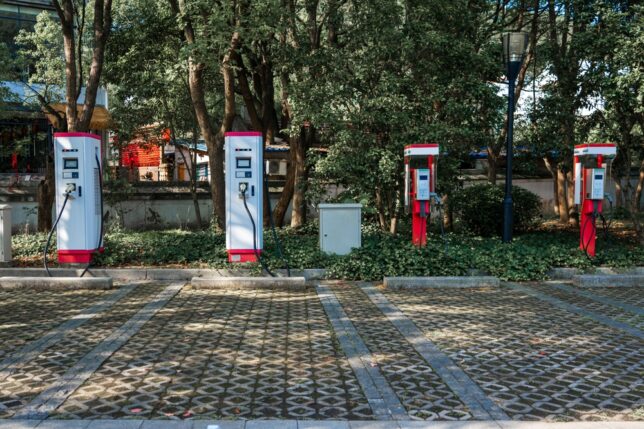Green Watch
Climate Alarmists Hoover Up Corporate Welfare:
“Clean Tech” Car Trouble
 Electric car charging stations. Credit: John_T. License: Shutterstock.
Electric car charging stations. Credit: John_T. License: Shutterstock.
“Clean Tech” Car Trouble

Climate Alarmist Blockade Operation Hoovers Up Corporate Welfare for Insincere Solutions (full series)
The Rocky Mountain Institute | Reuben Munger
“Clean Tech” Car Trouble | Too Much Honesty
“Clean Tech” Car Trouble
Given the DOE’s financial history with this stuff, “red” may be a more representative color.
Some of the red ink from the Fisker fiasco spilled on billionaire venture capitalist John Doerr of the Kleiner Perkins investment firm. After a career of early and very lucrative Silicon Valley investments in names such as Google and Amazon, Doerr announced in 2008 that he’d be focusing a $500 million fund on “clean tech” investments. One of them was Fisker. To say the least, it didn’t become the next Google.
By January 2012, Wired magazine discussed Doerr in a feature titled “Why the Clean Tech Boom Went Bust.” A January 2013 Reuters report was titled “How Cleantech Tarnished Kleiner and VC Star John Doerr.” And Doerr’s misadventures were again featured in an April 2019 Fortune magazine profile: “How the Kleiner Perkins Empire Fell.”
Doerr is a seven-figure donor to the Rocky Mountain Institute.
Benificus Foundation, Doerr’s family foundation, is listed as a “$1 million and above” donor in the RMI’s 2021 annual report. During 2020 Doerr was chairman of the board at the Climate Imperative Foundation when that nonprofit gave $942,000 to RMI. Beneficus (i.e., Doerr) subsequently reported a $16.1 million donation to Climate Imperative for 2021, and in Rocky Mountain Institute’s 2022 annual report it showed a “$1 million and above” donation from Climate Imperative.
In May 2022, before passage of the IRA, Doerr advised Silicon Valley to “triple down” on “clean tech” investments.
“Thank you @POTUS for signing the historic #InflationReductionAct into law and making clean energy more affordable for all Americans,” he wrote on Twitter in August 2022. Media reports that month also listed him as one of the top contributors to political committees making media buys to promote the IRA in advance of the November mid-term election.
A clearly patient man, Doerr was undeterred by those earlier setbacks in his climate alarmism investing strategy. Today his so-called clean tech is back in style, and Uncle Sam is even more willing to play sugar daddy.
Clean Nuclear Energy
Another of the Rocky Mountain Institute’s sugar daddies is Michael Hass, founder and CEO of Orion Renewable Energy Group and a developer of weather-restricted wind and solar projects since 1998.
Hass joined the RMI board sometime during the year that ended June 2016 and was listed in that position in tax forms for the year ending June 2022. The nonprofit’s annual reports credit him as a donor of $1 million or more for 2015 and 2016 and then consistently thank him for grants of $100,000 or more each year from 2017 through 2022.
Haas is also the founder and remains a board member of the Alliance for Climate Education, a nonprofit that feeds climate alarmist propaganda to high school students. Although supposedly an advocate for carbon-free energy, ACE was one of 715 groups that cosigned a May 2021 open letter to Congress that falsely maligned nuclear power as a “dirty” energy and a “significant” source of pollution. Tellingly, the letter also specifically demanded that “proven renewable energy technologies like wind and solar” be the protected beneficiaries of federal subsidies.
Earlier that year, in March 2021, the U.S. Department of Energy produced a nuclear energy tutorial titled “3 Reasons Why Nuclear is Clean and Sustainable.” The tutorial reported that nuclear power is “a zero-emission clean energy source” that “produces minimal waste” and that the nuclear fuel “produced by the U.S. nuclear energy industry over the last 60 years could fit on a football field at a depth of less than 10 yards!”
Nuclear power is currently—and decisively—America’s largest source of carbon-free electricity. In 2022, nuclear power still generated 33 percent more electricity in America than all the solar panels and wind turbines combined. Yet largely because of opposition from supposedly carbon-concerned politicians and nonprofits, virtually zero progress has been made in this promising sector over the past two decades. Total American nuclear power production in 2022 was less than it was in 2005.
If Haas and his allies had advocated for it, they might have made real progress in reducing carbon emissions. Nuclear fuel is functionally limitless in its availability. A successful effort to triple U.S. nuclear output since 1990 could have displaced all the coal we currently burn to create electricity.
The real “dirty energy” secret is the environment getting chewed up by the supposedly “green” wind and solar industry. The Department of Energy tutorial also reported that “nuclear energy produces more electricity on less land than any other clean-air source” and that “you would need more than 3 million solar panels to produce the same amount of power as a typical commercial reactor or more than 430 wind turbines.”
Reliable nuclear energy is a direct threat to the intermittent energy business Michael Hass has been in for 25 years. It shouldn’t be a surprise that two of the nonprofits he has closely associated with specifically oppose nuclear and endorse subsidies for weather-dependent wind and solar development.
The final version of the IRA did provide some incentives for nuclear power, but so little that the aforementioned Goldman Sachs estimate projects virtually no growth over the next 25 years in the total amount of nuclear power produced.
What Hass’s nonprofits have supported, and what the IRA heavily subsidizes, is corporate welfare that pays for the needless devouring of the environment to produce intermittent, unreliable energy. It’s a misuse of the language to refer to the agenda of the Rocky Mountain Institute and Alliance for Climate Education as “environmentalism.”
In the next installment, investors have often admitted the truth that tax credits are driving their investments in “green” energy.



